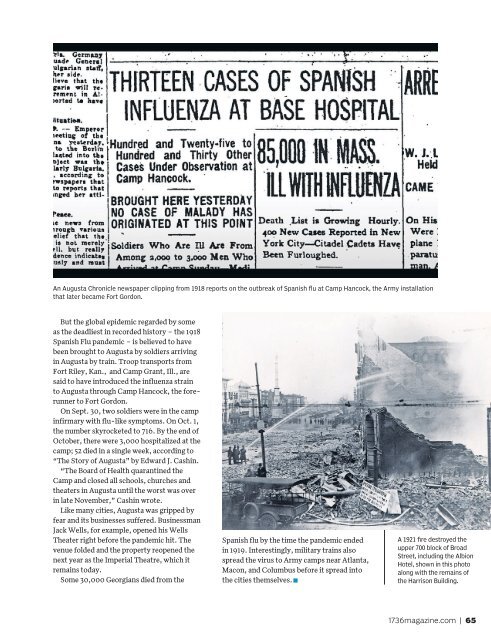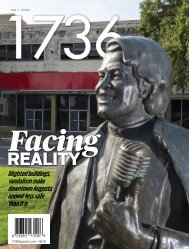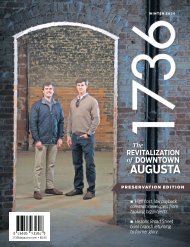Downtown business owners try to keep smiling amid pandemic - 1736 Magazine, Summer 2020
- No tags were found...
Create successful ePaper yourself
Turn your PDF publications into a flip-book with our unique Google optimized e-Paper software.
An Augusta Chronicle newspaper clipping from 1918 reports on the outbreak of Spanish flu at Camp Hancock, the Army installation<br />
that later became Fort Gordon.<br />
But the global epidemic regarded by some<br />
as the deadliest in recorded his<strong>to</strong>ry – the 1918<br />
Spanish Flu <strong>pandemic</strong> – is believed <strong>to</strong> have<br />
been brought <strong>to</strong> Augusta by soldiers arriving<br />
in Augusta by train. Troop transports from<br />
Fort Riley, Kan., and Camp Grant, Ill., are<br />
said <strong>to</strong> have introduced the influenza strain<br />
<strong>to</strong> Augusta through Camp Hancock, the forerunner<br />
<strong>to</strong> Fort Gordon.<br />
On Sept. 30, two soldiers were in the camp<br />
infirmary with flu-like symp<strong>to</strong>ms. On Oct. 1,<br />
the number skyrocketed <strong>to</strong> 716. By the end of<br />
Oc<strong>to</strong>ber, there were 3,000 hospitalized at the<br />
camp; 52 died in a single week, according <strong>to</strong><br />
“The S<strong>to</strong>ry of Augusta” by Edward J. Cashin.<br />
“The Board of Health quarantined the<br />
Camp and closed all schools, churches and<br />
theaters in Augusta until the worst was over<br />
in late November,” Cashin wrote.<br />
Like many cities, Augusta was gripped by<br />
fear and its <strong>business</strong>es suffered. Businessman<br />
Jack Wells, for example, opened his Wells<br />
Theater right before the <strong>pandemic</strong> hit. The<br />
venue folded and the property reopened the<br />
next year as the Imperial Theatre, which it<br />
remains <strong>to</strong>day.<br />
Some 30,000 Georgians died from the<br />
Spanish flu by the time the <strong>pandemic</strong> ended<br />
in 1919. Interestingly, military trains also<br />
spread the virus <strong>to</strong> Army camps near Atlanta,<br />
Macon, and Columbus before it spread in<strong>to</strong><br />
the cities themselves.<br />
A 1921 fire destroyed the<br />
upper 700 block of Broad<br />
Street, including the Albion<br />
Hotel, shown in this pho<strong>to</strong><br />
along with the remains of<br />
the Harrison Building.<br />
<strong>1736</strong>magazine.com | 65
















